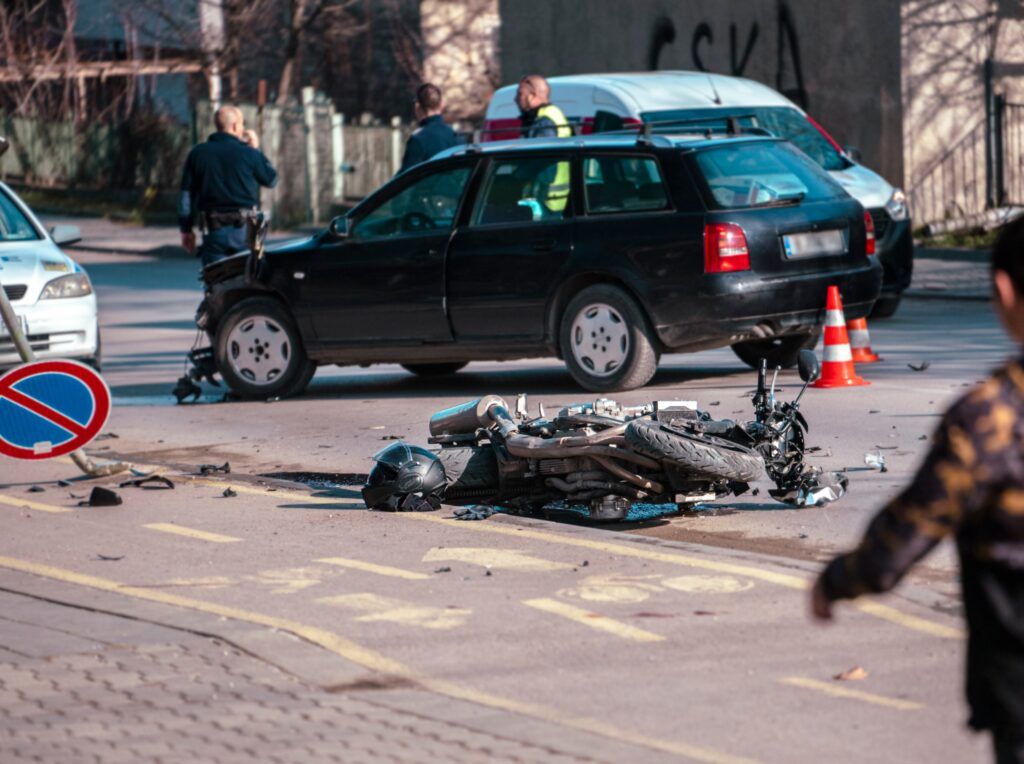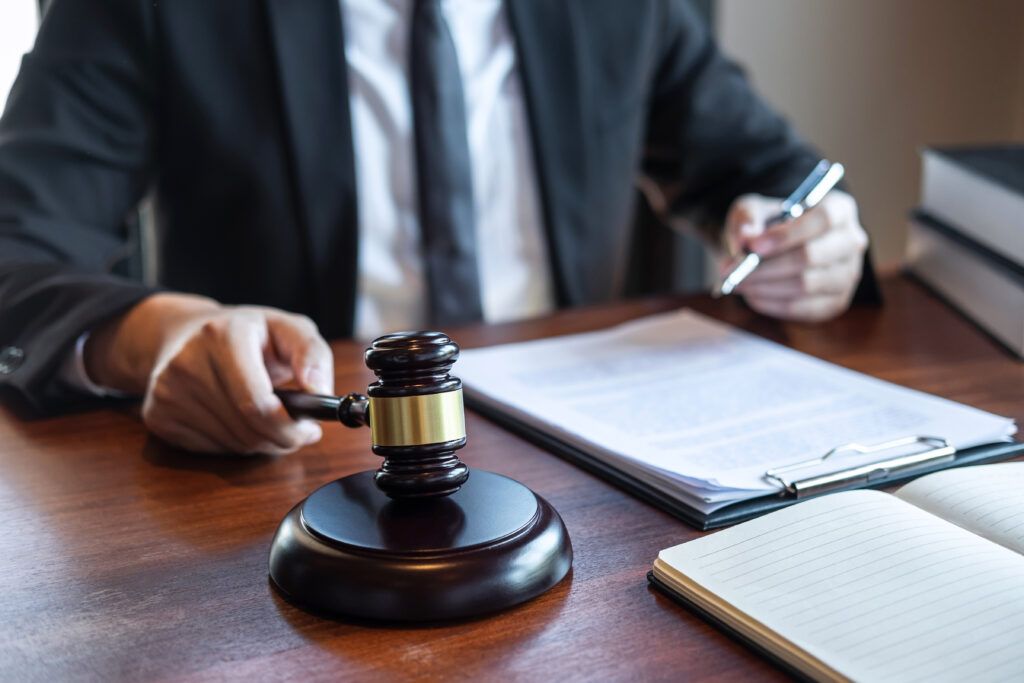Other motor vehicles are most responsible for motorcycle collisions. Two of the most common causes of motorcycle accidents involve visibility issues with other drivers: motorists making left-hand turns and drivers opening their car doors into unsuspecting motorcyclists.
If you’ve suffered an injury in a motorcycle accident or suffered the untimely loss of a loved one in a wrongful death resulting from a motorcycle accident, consult with an Savannah motorcycle accident attorney immediately. They will legally advise from a place of understanding and compassion. You may be eligible for financial compensation.
How Do Motorcycle Accidents Differ From Other Motor Vehicle Accidents?
Before discussing what causes motorcycle accidents, it’s relevant to understand how they differ from other motor vehicle accidents. Motorcycle accidents differ from other motor vehicle accidents in many ways. Some significant factors include the severity of injuries, fatality rate, and road hazards.
- Severity of Injuries: Motorcyclists are more inclined to suffer severe injuries due to a lack of protection, including spinal cord injuries, traumatic brain injuries, and broken bones.
- Fatality Rate: The fatality rate for motorcycle riders is almost 24 times the passenger car occupant fatality rate.
- Road Hazards: Motorcyclists are more susceptible to dangerous road conditions, such as cracks in the concrete, potholes, shoulder drops, loose gravel, and other debris.
Inclement weather is more dangerous for motorcycle riders than other motorists because they are less protected from the elements. Rain, snow, and icy road conditions are far more treacherous to navigate on a motorcycle.
Motorcycle Accident Statistics
The National Highway Traffic Safety Administration presents several key findings in its NHTSA motorcycle crash data report, including:
- Motorcyclists represent 3.5 percent of motorists on the road.
- Motorcycle fatalities account for 15 percent of all traffic fatalities.
- Motorcyclists have much less protection in an accident and face four times the injury risk than riders in passenger vehicles.
- Motorcycle riders killed in crashes at night are almost three times more frequently found to be alcohol-impaired than those killed during daytime.
- Two-wheeled motorcycles account for 90 percent of all motorcycles involved in fatal crashes.
For their research and reporting, the NHTSA defines a motorcycle as including 2-wheeled and 3-wheeled motorcycles, off-road motorcycles, motor scooters, mopeds, minibikes, and pocket bikes.
Most Common Causes of Motorcycle Accidents
Motorcycle accidents have many causes, and other drivers are mostly to blame. In addition to other motorists —pedestrians, cyclists, and riders of e-scooters and skateboards are responsible for causing motorcycle collisions. These are the most common causes of motorcycle accidents today.
Left-Hand Turns

Recent motorcycle crash data indicates that left-hand turns are responsible for 43 percent of all fatal motorcycle crashes. In these instances, the motorcyclists traveled straight when hit by another vehicle turning left, meaning these incidents are primarily the other driver’s fault.
Dooring
Dooring involves another driver opening their vehicle door into the path of a motorcycle rider, causing an accident. These incidents are usually not intentional and are matters of poor visibility, distraction, or negligence of the vehicle owner.
Still, the motorcycle rider may be entitled to recover financial losses due to the accident. Consult with a motorcycle accident lawyer to determine your next steps to getting the settlement you deserve.
Road Conditions and Hazards
Hazardous road conditions are another significant factor in motorcycle accidents. Examples of dangerous road conditions and hazards are as follows:
- Cracks in the concrete
- Potholes
- Expansion and open bridge joints
- Loose gravel, branches, and other debris
- Wet pavement
- Bumpy pavement
- Inadequate road signage
- Spillages on the roadway
- Malfunctioning traffic lights
- Lack of guardrails
- Edge breaks between lanes
- Railroad crossings
Congested roadways and construction areas are dangerous places for motorcycle riders, as they are more inclined to get in an accident.
Lane Splitting
Lane splitting allows motorcycle riders to drive between lanes of traffic moving in the same direction. It can happen on highways and undivided rural roads and is typically done when traffic stops or moves slowly.
It creates a situation where a motorcyclist can drive at a substantial speed when a driver who doesn’t see them riding between the lanes changes lanes into them, causing a crash. State laws vary on the legality of lane splitting, with California being the only state that explicitly allows it.
Unsafe Lane Changes
An unsafe lane change occurs when a motorist switches lanes and crashes into another vehicle occupying it. Unfortunately, this is a common fault of other drivers on the road due to blind spots and negligence in looking.
Distracted Driving
Distracted driving is prevalent with the use of smartphones in America, and are equally responsible for motorcycle accidents as they are for other motor vehicle accidents. Common driving distractions include:
- Being on a smartphone (talking, texting, scrolling)
- Applying makeup
- Applying toiletries (deodorant, hair gel, lotion, chapstick)
- Smoking
- Eating or drinking
- Using GPS
- Adjusting climate and radio controls
- Personal grooming
- Moving objects (pets and children) in the car
Daydreaming is a cognitive distraction that can take a driver’s mind off the road. It is a significant factor in distracted driving accidents involving other motorcyclists and drivers.
Blind Spots
Negligent drivers failing to check their blind spots is a primary cause of motorcycle accidents involving other motor vehicles. Motorcycles are smaller than other vehicles on the road, and many motorists don’t properly watch out for them.
Motorcycle Defects
A secondary cause of motorcycle accidents involves motorcycle defects, such as mechanical or electrical issues. These types of motorcycle accidents are uncommon, with only 5 percent of them being attributed to defects.
Sudden Stops
Sudden stops involve vehicles traveling at higher speeds forced to stop suddenly due to traffic congestion or negligent pedestrians. While motorcyclists don’t engage in more sudden stops than passenger car drivers, they typically sustain more substantial injuries in these rear-end collisions.
Speeding and Aggressive Driving

Driving too fast for conditions or above posted speed limits, including street racing, is the number one driving behavior responsible for fatalities. Motorists driving aggressively may be less likely to see motorcyclists when they carry on in hurried and angry fits.
If you’re a victim of aggressive driving or road rage, resulting in injuries or wrongful death, contact a motorcycle accident attorney immediately.
Impaired Driving
Impaired driving is also called drunk and drugged driving but includes fatigued driving. Some typical examples of impaired driving are as follows:
- Driving while under the influence of alcohol
- Driving while under the influence of illicit drugs
- Driving while impaired by over-the-counter medications
- Driving while impaired on prescription medications, like narcotics and benzodiazepines
- Drowsy driving
A medical condition affecting your driving may also be considered impaired driving. Drivers who shouldn’t be on the road due to a medical condition limiting abilities, such as a stroke, or due to cognitive decline like dementia, cause motor vehicle and motorcycle accidents and injuries.
What to Do After a Motorcycle Accident
After the shock and adrenaline subside, motorcycle accident victims must take four critical steps to ensure little complication in the aftermath. These steps involve getting a medical evaluation, following medical orders, documenting injuries, and hiring a motorcycle accident lawyer.
Seek Medical Attention
The first thing anyone involved in a motorcycle should do is seek medical attention. Ask for a comprehensive medical evaluation to ensure a complete assessment of symptoms and injuries. Injured parties will need this evaluation to build their case on. The sooner you go in, the better it looks regarding the severity of injuries.
Follow Physician Discharge Orders
Follow your doctor’s orders as directed in your discharge summary. Some painful symptoms of motorcycle accidents sometimes do not show up for a few days. Your physician will advise you on any limitations or restrictions, such as:
- Limits or restrictions on how much weight you can lift or carry
- Limits or restrictions on bending and squatting
- Limits or restrictions on pushing and pulling
- Limits or restrictions on returning to work
If your doctor refers you for rehabilitative services, it is vital that you make the appointments and complete your recovery. These services may include physical, massage, occupational, and vocational therapists, audiologists, and chiropractors.
Document Injuries and Recovery
Keep an injury or post-accident journal to document your accident, injuries, and recovery. These entries should be dated, detailed, and outline:
- Pain levels
- Mental and emotional distress
- Difficulties or inability to do things you could do before the accident
- Detailed accounting of the accident.
You may also document medical and rehabilitation appointments, including travel time. Your attorney will use your injury journal to help establish financial losses and damages, like pain and suffering.
Retain a Motorcycle Accident Attorney
Retaining a motorcycle accident lawyer is the next step after your medical evaluation for many reasons, including protecting you from insurance companies while ensuring fair compensation.
How Will a Motorcycle Accident Attorney Help?
Navigating the complex legal system while also hurrying around to medical and physical therapy appointments and suffering from discomfort and pain is a difficult feat. Hiring an experienced attorney can help your case in many ways, such as:
Manage Legal Deadlines and Paperwork
Motorcycle accident claims and lawsuits involve a lot of paperwork, and there are filing deadlines for processing the claims. Having a lawyer who confidently navigates the system for similar cases is a significant weight off your shoulders.
Protect You Against Insurance Companies
Insurance companies are notorious for deploying shady tactics to get unsuspecting motorcycle accident victims to make statements they can use against them. Some of the things they do to deny liability are:

- Advising that you do not need a lawyer.
- Pretending to be a friend to you to get you to say things they can use to deny liability, later placing the blame on you.
- Pressuring or demanding you make a recorded statement about how you are feeling and what injuries you have immediately after the accident before you may even be experiencing symptoms of things like whiplash and concussion.
- Asking a line of designed questions to harm your credibility.
- Pressuring you to release your medical records.
- Suggesting their in-house doctors evaluate you, possibly minimizing injuries.
- Offering settlements that only cover the cost of your copays.
Sometimes, insurance companies will stoop as low as to hire private investigators to spy on you after your motorcycle accident. Spying may involve in-person activities and your social media accounts waiting to catch you doing or posting something to discredit your injuries and, thus, their company’s liability.
Lead an Exhaustive Investigation Into Your Case
Experienced motorcycle attorneys lead exhaustive investigations into claims to ensure they can prove negligence and secure compensation. Their investigation entails:
- Gathering police reports, photos of injuries, pictures and video footage of the accident scene, dash cam footage, and other evidence.
- Tracking down, interviewing, and recording witness statements.
- Working with accident reconstruction experts to recreate the accident scene, pinpointing precise moments of fault and liability.
- Consult with expert witnesses, such as medical, vocational, and mental health experts, who can testify about your injuries.
After your lawyers collect all of the evidence and speak with experts regarding the circumstances of your case, they will carefully analyze the details.
Determine All of Your Damages
Determining losses and calculating damages is an extensive process involving adding receipts, invoices, and billing statements and ascribing a monetary value to non-monetary losses that are more challenging to prove. Some common damages you can recover in a motorcycle accident claim include:
- Medical and rehabilitation expenses
- Lost income, bonuses, promotions, and benefits
- Diminished earning capacity
- Property damages
- Mental anguish and emotional suffering
- Loss of enjoyment of life
- Chronic pain
- Loss of activities you could do before the accident
- Disfigurement and scarring
- Loss of consortium, companionship, and physical relations
Remember to document evidence of these damages in your injury journal. Your motorcycle accident lawyer will use it as evidence of losses to recoup. Surviving victims of wrongful death (spouse, children, family members) may also be entitled to recover these losses and more.
Negotiate With Insurance Adjusters

Accident victims with legal representation tend to secure more substantial settlement checks. Part of that is because lawyers are skilled negotiators who aren’t intimidated by insurance pressure to settle too soon or for too little money. Negotiations often involve multiple rounds before both parties agree on a settlement amount.
Most motorcycle accident claims are settled outside of court. However, if your case is the exception, your attorney will file the lawsuit, complete the discovery process, and represent you fully in court.
Work in Contingent Arrangements
Motorcycle accident attorneys work for contingency. Contingent fee arrangements allow clients to avoid paying anything out-of-pocket —ever. Your attorney will disclose their contingency fee during your initial consultation and only collect it if they successfully procure financial compensation for your claim.
Hire A Skilled Motorcycle Accident Attorney To Protect Your Rights
If you’ve been involved in a motorcycle accident, it’s important to take action quickly and hire an experienced Savannah personal injury attorney. Waiting too long to seek legal representation can be a costly mistake. Schedule a free consultation today to determine your case needs.
